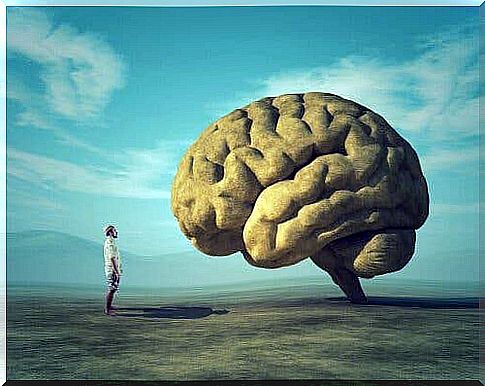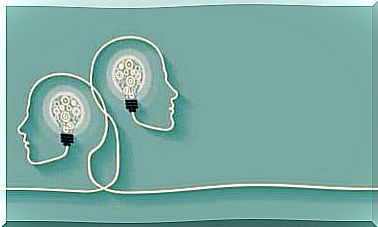The Neurology Behind The Influence Of Mistrust

The neurology behind the influence of mistrust indicates that the brain has an innate tendency to help humans discover dangers and threatening stimuli. In fact, this mechanism has evolved a bit more in recent years. Some phenomena, such as fake news, reinforce these effects of mistrust.
But is it true that we humans are becoming increasingly suspicious? It is definitely possible, even if there are no direct benefits to it. It is true that we humans must learn to stand with both feet well placed on the ground and use our filters to distinguish truths from lies. Few things, however, are as sad as a lack of confidence in the world. This is because it only leads to distancing oneself from others. Distrust creates a distrust of prevailing institutions and can also be close to conspiracy theories.
In addition, the influence of mistrust has a negative effect on your psychological health. This is something very few people talk about. Although the human brain has mechanisms for detecting risks and threats, social connection is its actual priority. Humans are social beings who must live together in groups to survive, interact, laugh, cry, share and build, and so on.
The influence of mistrust involves stress and builds walls that discourage attachment. People perform best when they work together – but only when they can create synergies and mutual trust as a mechanism for progress.

The impact of neurology and mistrust
Here are some examples to understand what neuroscience has to say about mistrust. Who has not fallen for a fake news ever? Someone sends you a notice and you read it. Since it is something that surprises you, you assume it is valid and pass it on to others. Then you will soon know that it was fake and that you feel naive. Thus, it bothers you that you fell for the pleasure of the news.
But if it happens to you a few more times, something changes. You become skeptical and less receptive. It’s because you, deep down, have changed.
Something similar happens in your relationships. When someone who means a lot to you betrays your trust, you may feel a pain that goes beyond anger and irritation. This is because what you are really experiencing is emotional pain.
These two situations reveal that emotions vary at the cerebral level. Thus, negative and uncomfortable emotions not only affect your mood.
They can even lead you to change your behavior. This is because you become stricter when it comes to believing in the news and no longer trust people, mainly because you want to avoid further disappointments. Okay, that sounds good, but what does the neurology behind this mistrust show?
The influence of trust and mistrust affects different parts of the human brain
One can say that there is a trusting brain and a suspicious brain. The first is in the area of the prefrontal cortex, which is the area of processes such as higher thinking and executive functions such as attention, reflection, deduction, assessment and empathy.
- Confidence releases powerful neurochemicals, such as oxytocin, into the human brain. One could argue that this dimension is one of the most transcendental for us humans. This is because trust in others is comforting.
- Similarly, the neurology behind the influence of mistrust indicates that this condition stems from a more primitive mechanism. When humans experience it, the amygdala and other regions of the limbic system are activated.
- The brain experiences mistrust just as it experiences stress. It is a condition in which it secretes cortisol, which reduces your critical and reflective ability and empathy.
Distrust makes you more cautious. In some cases, however, it also leads to an inability to reflect, reason and see things in a broader perspective. This in turn leads to you becoming rigid and even showing aggressive behavior to block the object of your distrust.

Dimensions one must take into account in a culture of mistrust
In fact, you may be living in the midst of a culture of mistrust and having difficulty believing what you read and hear. As we said at the beginning of this article, this type of perception is not only sad but very negative for yourself and for society in general – but what can be done about it at a time when agenda journalism is all-encompassing?
To this end, the neurology behind the influence of mistrust indicates that you must try to reverse your mistrust, at least in cases where the presumptive lie is not obviously harmful to you and the people you have real contact with. Because it is a high price to pay to experience a continuous feeling of mistrust because the brain experiences it as stress. Not being able to trust those around you, the daily news, your leaders and public institutions throws you into a state of constant insecurity and discomfort. You’re always on the defensive.
Reflections on the influence of mistrust
- You should distrust a specific situation or person, the one you have had a specific problem with or who has already let you down or lied to you. Own experiences are in the end the only thing that counts; do not generalize; do not judge on the advice of others.
- You can not go through life with an all-or-nothing strategy. Neither people nor societies are perfect, everyone makes mistakes. The fact that someone once disappointed you does not mean that it is their conscious routine.
- If you do not trust someone, this person will not trust you either. Thus, trust should be your basic attitude towards others.
- Do not give in to peer pressure. Often people around you can encourage you to distrust, to close your ears, your eyes and your heart to many of the things and people around you. So think for yourself.
In conclusion, there is nothing more important in difficult times than helping and trusting each other. It is as important as the air we breathe. Only you can dare to trust others, only you can break the influence of mistrust. Dare to give it another chance!









